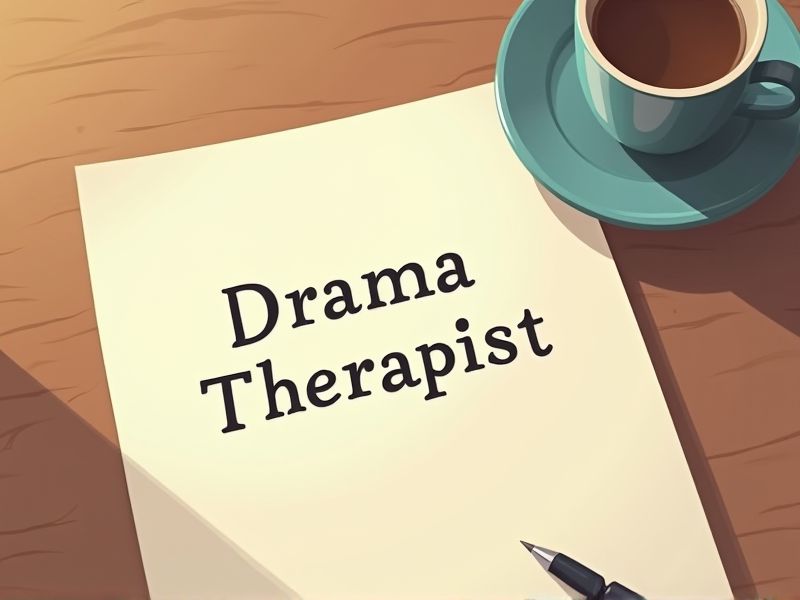
Drama therapists often work with individuals dealing with serious emotional and psychological issues, requiring them to have specialized knowledge and skills. Acquiring certain certifications ensures they meet professional standards and provide safe and effective therapeutic practices. These certifications demonstrate a therapist's commitment to maintaining ethical practices and staying informed about current therapeutic methodologies. Key certifications crucial for a drama therapist include the following.
Registered Drama Therapist (RDT)
Registered Drama Therapists (RDT) have formal education and training, which ensures they possess the theoretical knowledge and practical skills necessary for therapeutic practice. Specific credentials like RDT provide a standard of competence, giving clients assurance of the therapist's professional qualifications. Regulatory requirement adherence in mental health fields typically enhances the credibility and acceptance of practices like drama therapy. Liability and ethical practices are more ensured under a recognized certification, offering protection to both the therapist and the client.
Certificate in Drama Therapy from an accredited program
A Certificate in Drama Therapy from an accredited program ensures the therapist has met specific professional standards, which enhances credibility in the field. This credential signals to potential clients and employers that the therapist possesses the necessary skills and theoretical knowledge. Accreditation guarantees that the educational program follows guidelines critical for comprehensive training in therapeutic practices. Lack of a recognized certificate could lead to challenges with legal recognition and professional legitimacy in therapeutic settings.
Certified Expressive Arts Therapist (CEAT)
Drama therapy often involves exploring deep emotions and potentially traumatic experiences. Certified Expressive Arts Therapists (CEAT) provide an essential skill set in integrating different forms of expression, enhancing the therapeutic process. Their certification ensures they have comprehensive training in using creative modalities safely and effectively. Without such expertise, the therapy may lack depth and fail to address nuanced aspects of recovery or self-discovery.
Registered Play Therapist (RPT)
Drama therapists benefit from being Registered Play Therapists, as it enhances their ability to use play-based interventions effectively with children. RPT certification provides additional skills in understanding developmental stages, which is crucial in tailoring drama therapy activities. The knowledge from RPT helps in creating safe environments where children can express themselves non-verbally through drama. It also ensures drama therapists are equipped with diverse therapeutic approaches, giving them flexibility to address various emotional and psychological needs.
Licensed Professional Counselor (LPC)
Drama therapists often work with clients facing complex emotional issues, and an LPC provides crucial mental health expertise to navigate these challenges. The rigorous training an LPC undergoes ensures they possess a deep understanding of therapeutic techniques, enhancing the efficacy of drama therapy sessions. State regulations frequently mandate an LPC to guarantee standardized care and to address liability issues in therapeutic settings. Clients benefit from the additional credentials, as it assures them of a professional commitment to ethical and evidence-based practices.
Certified Clinical Mental Health Counselor (CCMHC)
Certified Clinical Mental Health Counselors (CCMHC) provide a foundation in clinical psychology that enhances a drama therapist's therapeutic techniques. This certification ensures drama therapists have a deep understanding of mental health disorders, crucial for effective treatment. With CCMHC training, drama therapists can better assess and respond to complex emotional and psychological needs during therapy sessions. The integration of CCMHC principles elevates the credibility and efficacy of drama therapy within diverse clinical settings.
Certified Expressive Arts Facilitator (CEAF)
Drama therapists use techniques from the arts to facilitate healing, and a Certified Expressive Arts Facilitator (CEAF) provides structured guidance to enhance these therapeutic processes. The CEAF qualification ensures that facilitators are equipped with the necessary skills to integrate various expressive modalities, enriching the therapeutic scope. This certification validates the facilitator's proficiency in adapting artistic interventions to individual needs, leading to more effective client outcomes. Demand for diverse and inclusive healing approaches in therapy settings increases, thereby highlighting the importance of qualified facilitators in delivering comprehensive care.
Trauma-Informed Care Certification (TICC)
Trauma-Informed Care Certification equips drama therapists with essential strategies to recognize and respond to trauma-related symptoms in clients. This certification ensures therapists create a safe and supportive environment, promoting clients' sense of control and empowerment. Understanding trauma's impact on behavior and emotional regulation enhances therapeutic outcomes in drama therapy. Certification provides therapists with evidence-based frameworks to integrate trauma-sensitive practices into their therapeutic models.
Certified Group Arts Facilitator (CGAF)
Certified Group Arts Facilitators bring structured frameworks and evidence-based techniques that enhance the therapeutic process in drama therapy, ensuring effective outcomes. They possess specialized skills to foster a safe and creative environment, which is crucial for clients to express emotions and experiences. Their certification signifies a comprehensive understanding of group dynamics, critical for facilitating meaningful interactions in drama therapy sessions. The presence of a CGAF aids in maintaining ethical standards and professional integrity in therapeutic practices.
Crisis Intervention Certification
Crisis intervention certification equips drama therapists with essential skills to effectively manage acute psychological distress in clients. It ensures therapists have the tools to de-escalate situations, which increases client safety and therapeutic effectiveness. Certification enhances a therapist's ability to recognize signs of crisis, facilitating timely and appropriate interventions. This certification also fosters greater trust and confidence among clients seeking mental health support, knowing their therapist is prepared for emergencies.
Summary
When you obtain certifications in drama therapy, your professional credibility and marketability increase. Clients are more likely to trust your expertise, leading to a broader client base. Certified skills can enhance therapeutic outcomes, optimizing treatment plans for various psychological conditions. Engaging in continuing education often accompanies certification, ensuring your methods remain current and effective.
